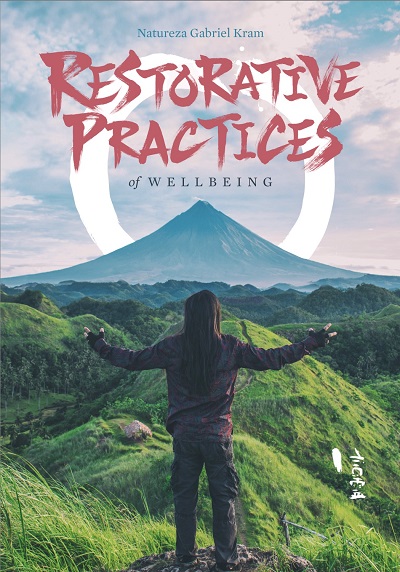Natureza Gabriel Kram’s new book is arguably a product of our time. In an era where spirituality, non-theological holism, and fact-based therapies are started to be compounded, Restorative Practices of Wellbeing is refreshingly concise in terms of topicality. It focuses on something inherently intangible: specifically the generalized field of trauma, and how to recover from said trauma in a manner genuinely addressing the problem, rather than a corporate-minded, tailor-made model often mandating medication.
ABOUT THE BOOK: https://restorativepractices.com/books/
In the process, Kram pulls from numerous practices native to cultures around the world, simultaneously showcasing and paying tribute to different societies and creating a homeopathic model that covers an A to Z road to recovery. While addressing our past traumas starts with mental exercises, Kram expertly shows that there’s so much more to the process. “In Indigenous and traditional societies, when people experienced stress, or threat, war, or disaster, there was a body of practices that existed to bring the people back into balance. Often priests, or shamans, or medicine people were the custodians of these activities that brought restoration and balance,” he writes. “These were bodies of practice: ceremonies—of initiation, renewal, remembrance. Rituals—of grief, lamentation, condolence. Healings, dances, trances, songs, storytellings, theatrical performances, collective undertakings, hunts, seekings, divinations, art-makings, cultural enterprises. They were quests undertaken to receive a vision, to gather medicine, to consult with ancestors, plants, animals. They were contemplative practices, meditations. Cleansing and purification practices…”
He goes on to state: “At (my organization), which I convened with 40+ mentors and advisors from 20 disciplines of well-being across 18 cultures, we work in the (re-) emerging field of connection phenomenology, at the intersection of seven consilient disciplinary streams: mindful awareness, neurophysiology, relational mindfulness, deep nature connection, creativity, cultural linguistics, and ancestral lifeways. Our founding advisors have a combined 823 years of experience: that is not a typo. We are an ancestral neuro-technology cooperative. I personally have spent the past 25 years studying, assembling, collating, and synthesizing restorative practices of well-being. These practices form a varied and universal practical human inheritance of well-being.”
AMAZON: https://www.amazon.com/Restorative-Practices-Wellbeing-Natureza-Gabriel/dp/1736280317
By making the book progressive and inclusive, Kram is able to incorporate many winning strategies into one, crucial focal point. Specifically, a wide, all-encompassing, and dynamic path to healing – not eschewing what modern medicine and psychology has to offer, but adding a deep and empathetic angle to things those professions aren’t necessarily wholly attuned for. Kram is also able to highlight what he believes is the root cause of statistical risings in people’s reported traumas, specifically technological innovation leading to increasing feelings of abandonment and isolation. “If you don’t believe the zombie apocalypse has already happened, walk into any restaurant in a major urban mall in America, and count the number of people engaged in intimate face-to-face, voice-to-voice, attuned communication…,” he writes. “The social landscape of the modern world is post-apocalyptic already. We were socially distant long before a pandemic put this word into our daily lexicon.”
Cyrus Rhodes



























